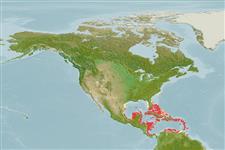>
Blenniiformes (Blennies) >
Tripterygiidae (Triplefin blennies) > Tripterygiinae
Etymology: Enneanectes: Greek, ennea = nine times + Greek, nektos = that swimms (Ref. 45335).
Environment: milieu / climate zone / depth range / distribution range
Ecologia
marinhas associadas(os) a recifes; intervalo de profundidade 0 - 11 m (Ref. 26938). Subtropical; - 9°N
Western Central Atlantic: southeastern Florida in USA, Bahamas and Yucatan in Mexico to Venezuela.
Tamanho / Peso / Idade
Maturity: Lm ? range ? - ? cm
Max length : 4.0 cm TL macho/indeterminado; (Ref. 7251)
Descrição breve
Morfologia | Morfometria
Espinhos dorsais (total): 10; Raios dorsais moles (total): 7; Espinhos anais 2; Raios anais moles: 15. This species is distinguished by the following characters: dark orbital cirrus, relatively broad, ending in a broad flat end or one to several shallow points; with 2-10 usually ctenoid scales on upper preopercle immediately behind eye, below sensory canal (in individuals over 1.8 cm SL); with a row of 4–9 intense dark, rounded spots along pored lateral-line, centered on dark body bars; the iris with six wide, red, spoke-like bands with much narrower interspaces (when live or fresh), spoke at 2 o’clock notably narrower than others; short snout with a broad dark band from orbit across front half of upper and lower jaws; the prominent dark bar curving from lower rim of orbit usually past corner of jaws and followed behind by a broad light bar, often with a central dark patch; dark dorsal head, preopercle and opercle; the rear body is bright red to red-orange, especially ventrally; anal fin is usually uniformly pigmented, but sometimes barred with reddish or dusky bands slanting forward from base; the caudal-peduncle dark bar is typically ovoid (wider at center with corners rounded) and usually narrower in width than height, ending at base of caudal-fin rays, followed on caudal fin by a narrow “accent” bar, red and/or dark, and then, after a narrow pale (white in life) band, a broad dark tail band often interrupted with a pale circle top and bottom (lower is larger), then a narrow pale (white in life) band at rear margin (Ref. 116142). Characters shared with Enneanectes quadra: D III+XII+7, with the first dorsal fin short, not reaching second-spine base of second dorsal fin (often barely reaching fin origin) when adpressed; A II,15; pectoral-fin rays 15; usually 13 pored lateral-line scales and about 19 or 20 scales in notched midline row; belly and pectoral-fin base scaled and with 2 scales above rear of pored lateral-line, upper scale much smaller [both characters of scaled-belly subgroup]; body bars 5 with last bar on caudal peduncle much darker; anterior orbital flange with fine spines (Ref. 116142).
Adults live in and about coral reefs and rocky shores in clear water. (Ref. 7251). Eggs are hemispherical and covered with numerous sticky threads that anchor them in the algae on the nesting sites (Ref. 240). Larvae are planktonic which occur primarily in shallow, nearshore waters (Ref. 94114).
Life cycle and mating behavior
Maturidade | Reprodução | Desova | Ovos | Fecundidade | Larvas
Victor, B.C., 2017. The status of Enneanectes jordani and a new species of triplefin blenny from the Greater Caribbean (Teleostei: Tripterygiidae). J. Ocean Sci. Found. 27:48-73. (Ref. 116142)
Categoria na Lista Vermelha da IUCN (Ref. 130435)
Ameaça para o homem
Harmless
Utilização humana
Aquário: Espécies comerciais
Mais informação
Nomes comunsSinónimosMetabolismoPredadoresEcotoxicologiaReproduçãoMaturidadeDesovaAgregação para desovaFecundidadeOvosDesenvolvimento dos ovos
ReferênciasAquaculturaPerfil para aquaculturaEstirpesGenéticaElectrophoresesHereditariedadeDoençasProcessamentoNutrientsMass conversion
ColaboradoresFotografiasStamps, Coins Misc.SonsCiguateraVelocidadeTipo de nataçãoÁrea branquialOutras referênciasCérebrosVisão
Ferramentas
Relatórios especiais
Descarregue XML
Fontes da internet
Estimates based on models
Preferred temperature (Ref.
123201): 26.2 - 28.2, mean 27.4 °C (based on 528 cells).
Phylogenetic diversity index (Ref.
82804): PD
50 = 0.5001 [Uniqueness, from 0.5 = low to 2.0 = high].
Bayesian length-weight: a=0.00562 (0.00258 - 0.01228), b=3.08 (2.89 - 3.27), in cm total length, based on LWR estimates for this (Sub)family-body shape (Ref.
93245).
Nível Trófico (Ref.
69278): 2.7 ±0.3 se; based on size and trophs of closest relatives
Resiliência (Ref.
120179): Elevada, tempo mínimo de duplicação da população menor que 15 meses (Preliminary K or Fecundity.).
Fishing Vulnerability (Ref.
59153): Low vulnerability (10 of 100).
Nutrients (Ref.
124155): Calcium = 313 [100, 1,376] mg/100g; Iron = 2.52 [0.83, 6.35] mg/100g; Protein = 18.9 [17.0, 20.8] %; Omega3 = 0.141 [0.028, 0.683] g/100g; Selenium = 29.7 [4.9, 151.4] μg/100g; VitaminA = 22.2 [2.1, 232.5] μg/100g; Zinc = 4 [2, 8] mg/100g (wet weight);
